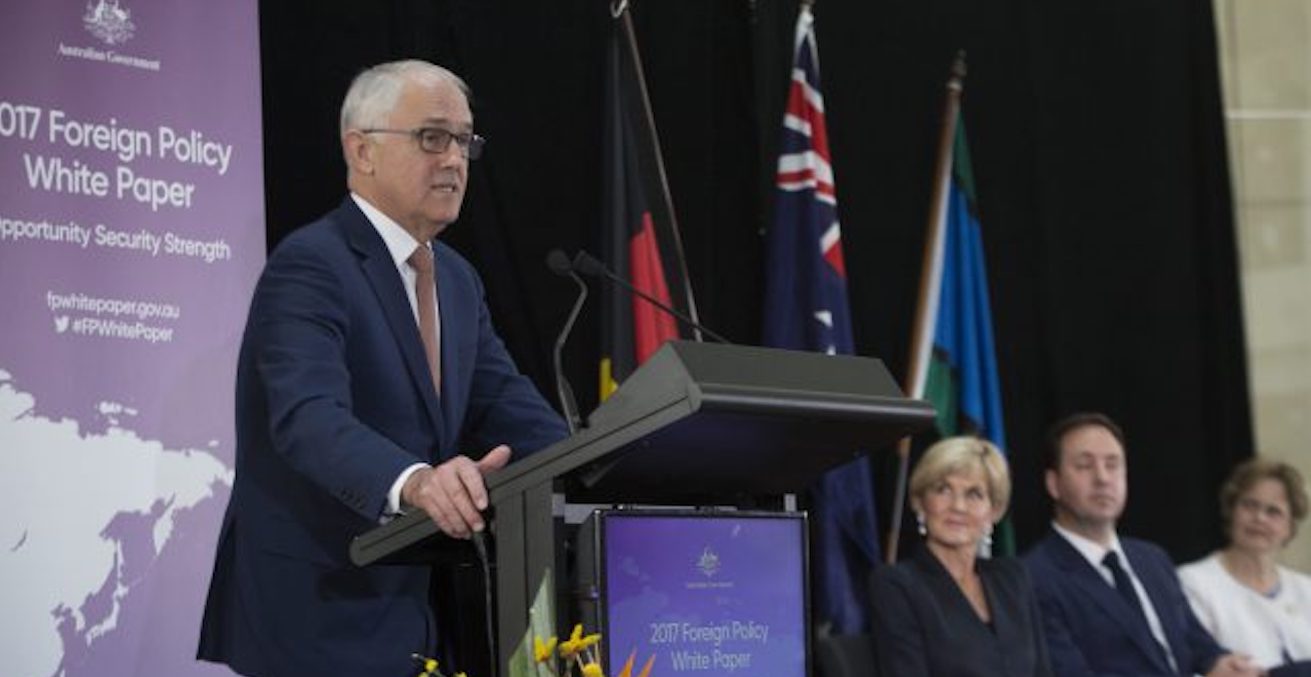Foreign Policy White Paper: Magical Thinking, No Resources

The new Foreign Policy White Paper is thoughtful and likely to last but is marred by the familiar idea that diplomacy and foreign policy happen effortlessly, and Australia’s future international relations require no additional resources.
The problem with foreign policy blueprints is that sinkholes appear so suddenly in the international landscape. If Australia’s foreign policy white paper had been launched just 18 months ago it would not have contemplated a world in which Donald Trump was the US president and Britain was leaving Europe.
But in the face of what Malcolm Turnbull calls “change, unprecedented in its scale and pace”, the document issued on 23 November makes as solid an effort as you could expect to say something useful about a world in which, it acknowledges, “often we will be responding to unexpected events”. Of the three Australian foreign policy white papers, this is the most thoughtful and likeliest to last.
The foreign policy challenges Australia faces are greater than any we have known since the 1960s, when it became clear Britain could no longer provide the security or economic support we needed. We managed that transition easily enough because other options opened up—the US as a security guarantor and Asia as a market for our exports. Such alternatives are not there now.
In many ways the paper’s approach is familiar, drawing on the three strands that have woven through the foreign policies of every Australian government since World War II: commitment to a strong alliance, support for regional engagement and recognition that as a country with global interests but limited power, we are always going to be better off in a world with agreed rules.
There’s new weight placed on “the free flow of trade, capital and ideas”, however. As the rest of the world backs away from it, “openness” is shaping up as a central point of debate in Australian politics.
At the core of the white paper’s analysis is the idea of a “contested world”, emerging most obviously for Australia in its relationships with China and the US. The alliance with the US is seen as central to sustaining the effectiveness and liberal character of the rules-based order and the stability of the region.
But there’s clear evidence of uncertainty about the future in references to the debates in the US about its international leadership.
The legitimacy of China’s role is acknowledged. China is welcome “to share responsibility for supporting regional and global security”. Its capacity to influence “virtually all of Australia’s international interests” is noted and the paper calls for deep and productive engagement, including on defence. There’s no containment fantasy here: the point is that we must try to shape our region in ways that make China’s rise and role more congenial to us. Real differences in interests and systems are acknowledged openly, including in the clearest statement I’ve seen of Australian concerns about China’s actions in the South China Sea.
Values hardly got a look-in in the Coalition’s first foreign policy white paper in 1997. By 2003, as the nation geared up for war in Iraq, they appeared but most prominently in their Australian form of “tolerance, perseverance and mateship”.
This time, “political, economic and religious freedoms, liberal democracy, the rule of law, racial and gender equality, and mutual respect” are at the centre of the argument, underpinning our own society and as a source of our international influence.
What are we going to do about this world? There’s less precision here but a recognition that it will require far more effort from us.
We will encourage “the strongest possible economic and security engagement by the United States in the region” and globally. We will work with Asian democracies and expand our ties with Southeast Asia.
Not for the first time in Australian foreign policy, a step-change is promised in our relations with the South Pacific.
On trade, the paper accepts that the endpoint of regional discussions should be a free trade agreement that includes China.
But something’s missing from all this. It’s as if the defence white paper had ended after describing a deteriorating security environment.
Australian politicians of all sorts are susceptible to the magical thinking that the business of diplomacy and foreign policy happens effortlessly, mostly when they are personally involved. Australia’s ability to protect and advance its interests, the white paper claims, rests on “the quality of our engagement with the world”, including our ideas, persuasive ability and the strength of our relationships.
At the launch, the prime minister proudly noted that his government was delivering “the largest revitalisation of the armed forces in Australia’s peacetime history”.
But apart from a desultory reference to the eventual opening of some diplomatic missions, there’s no sign that the government thinks the foreign policy situation is serious enough to require the commitment of any new resources to the task. If, indeed, the “stakes could not be higher”, that’s a surprising bet to place.
Allan Gyngell is president of the Australian Institute of International Affairs and author of ‘Fear of Abandonment: Australia in the World Since 1942’.
This article was first published in The Australian on 25 November 2017. It is republished with permission.





